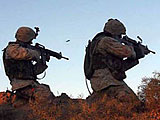Costs of War: The Iraq Onus
By Shaun Waterman for ISN
Although the 30 June deadline is laid out in the external pageUS-Iraq dealcall_made negotiated and signed last November by then-President George W Bush, both supporters and opponents of the new administration - each for their own very different reasons - are keen to paint the withdrawal as Obama’s policy.
His backers know that unhappiness about the war was a major factor in Obama’s election victory and want to show that he is moving decisively to end US involvement in a conflict that many Americans believe was a disastrous misstep.
His opponents, especially the hawks who were unhappy about the deal even when it was Bush’s, are concerned the pull-out may be premature and are keen to ensure that Obama owns any negative consequences.
"One might speculate that insurgents are waiting as soon as they get an opportunity to launch more attacks,” former vice-president Richard Cheney external pagetoldcall_made the Washington Times Monday.
But in reality, the timeline was set by neither Bush nor Obama. The deadline for getting out of the cities - and for the withdrawal of all US combat forces by 1 August next year - was set by the Iraqis.
Tuesday’s deadline is largely symbolic: Some 131,000 US troops will remain in Iraq, including 12 combat brigades, and the total is not expected to reduce significantly until after the Iraqi national election next January. Even when all combat troops are gone, as many as 35,000 will remain to train and support Iraqi forces.
Iraqi Prime Minister Nouri al-Maliki, adopting a stance US officials have tried to spin as posturing ahead of next year’s elections, called the withdrawal a external page“great victory”call_made for Iraq, and declared Tuesday a national holiday: Sovereignty Day. A celebration was scheduled for Zawra Park in Baghdad, with performances by musicians and poets, external pageaccording tocall_made the government newspaper As-Sabah.
But the real tests - both for al-Maliki and his US backers - are still to come. US commander in Iraq General Ray Odierno external pagedismissedcall_madethe recent the uptick in insurgent violence - 200 people have died in attacks in the last 10 days - as “extremist elements who are trying to bring attention to their movement that's been fractured.”
The attacks, he said, would bring “the ire of Iraqi citizens against these groups [...]. And frankly, I believe it will make it much more difficult for them to continue to operate inside of Iraq over the long term.”
But the locations of the most deadly attacks last week - the disputed city of Kirkuk and the huge Shiite district in Baghdad called Sadr City - are significant: They are ethnic flashpoints. The future of Kirkuk - divided between Arabs, Kurds and Turkmens - remains to be determined. And, according to the Wall Street Journal, Sunni residents of the western Baghdad neighborhood of Khadra external pagefearcall_made that the withdrawal of US forces will lead to a resurgence of sectarian violence - tolerated, if not actually carried out, by the security forces of the Shiite-led government.
Many analysts predict that insurgents, including al-Qaida in Iraq, will attempt to take advantage of the US redeployment to step up their attacks, in the hope of reigniting sectarian conflict.
Despite the confidence Odierno professes about the readiness of Iraqi forces to take over security in urban areas, they remain largely untested, and the New York Times reports that some Iraqi legislators are already external pagecallingcall_made for US forces to remain in the country past the 2010 deadline.
Any such delay is likely to be fiercely opposed by many Democrats. “The President absolutely has to resist any temptation to buy more time for political progress by keeping troops there to continue to coddle Iraq,” wrote Jon Soltz of VoteVets.org. “All it will mean is external pagemore violencecall_made that has American troops in the cross-hairs. The president must tell Iraqis that, if anything, we're going to speed up our timeline to leave Iraq if they continue to stall political progress.”
The underlying problem which Soltz identifies is that there has been no progress towards a durable political settlement in Iraq - a failure symbolized by the continuing inability of the government to reach a deal on dividing up the country’s oil revenues. The surge of US forces in 2007 was designed to create the space for such a settlement, and the inability of the Iraqis to reach one represents a profound failure of US strategy.

